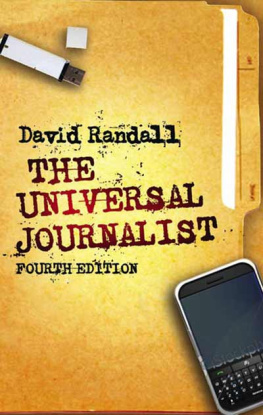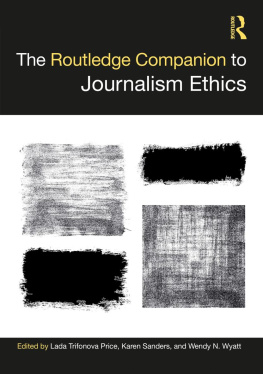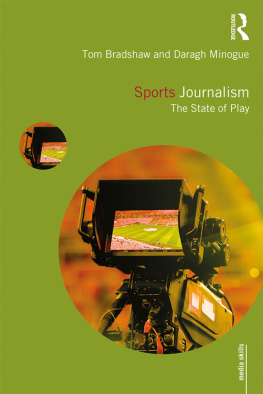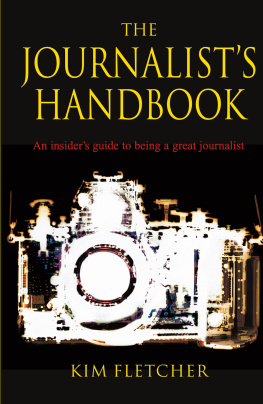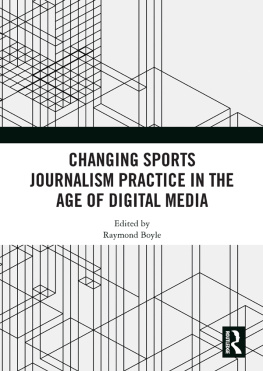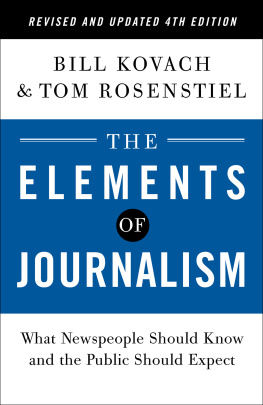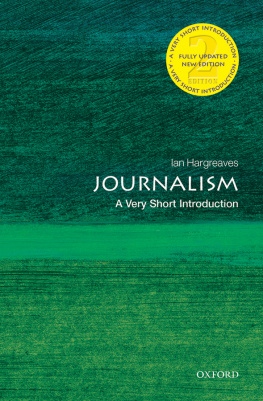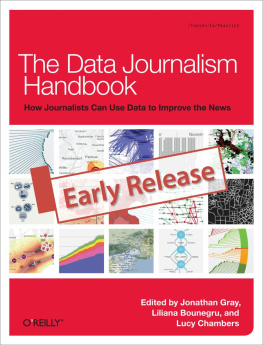Acknowledgements
At the risk of sounding like an Oscars-night bore, there is a long trail of people whose advice and spirit inhabit this book. It begins, at the first newspaper I worked on, with the late Geoff Collard (from whom I learnt that journalism without a sense of honour is not worth the name) and news editor Cathryn Sansom, whose hectoring lessons in professionalism seemed a curse at the time but have proved a rich blessing ever since. At the Observer, Peter Corrigan (by careful supervision) and writers like Peter Dobereiner, Hugh McIlvanney and the late Lawrence Marks (by example) showed me what sharp, clear writing really is. At the same paper, Paul Routledge and John Merritt gave me permanent lessons in how the best reporters think and breathe. On lecture tours in Russia, John Shirley taught me so much about how to take command of the material. And at the Independent and Independent on Sunday, where I continue my fourth decade in journalism, I learnt yet again that you never stop learning. In particular, Simon Ritters running commentary on each days content improved my ability to spot written nonsense, working with Michael Williams was akin to attending a private master class in handling daily news, and Keith Howitt has been a constant reminder that quality journalism begins and ends with attention to detail. Barely a day goes by without me testing in my head some potential intro, headline or news judgement against the standards these people set.
Finally, thanks to Giovanni De Mauro, editor of Internazionale in Italy, for letting me reproduce parts of my columns on journalism from that magazine. And a salute, too, to my son Simon who spotted at the proof stage several errors I had missed.
First published 1996
Second edition published 2000
Third edition published 2007
Fourth edition published 2011 by Pluto Press
345 Archway Road, London N6 5AA
www.plutobooks.com
Distributed in the United States of America exclusively by Palgrave Macmillan, a division of St. Martins Press LLC, 175 Fifth Avenue, New York, NY 10010
Copyright David Randall 1996, 2000, 2007, 2011
The right of David Randall to be identified as the author of this work has been asserted by him in accordance with the Copyright, Designs and Patents Act 1988
British Library Cataloguing in Publication Data
A catalogue record for this book is available from the British Library
ISBN-13 978 0 7453 3077 8 Hardback
ISBN-13 978 0 7453 3076 1 Paperback
Library of Congress Cataloging in Publication Data applied for
This book is printed on paper suitable for recycling and made from fully managed and sustained forest sources. Logging, pulping and manufacturing processes are expected to conform to the environmental standards of the country of origin.
10 9 8 7 6 5 4 3 2 1
Designed and produced for Pluto Press by Chase Publishing Services Ltd
Typeset from disk by Stanford DTP Services, Northampton, England
Simultaneously printed digitally by CPI Antony Rowe Ltd, Chippenham UK and Edwards Bros, United States of America
The Universal Journalist
by David Randall
Fourth Edition
Preface
This book contains all the best advice I have learnt or collected in three decades as a journalist. Some of it came direct and uninvited from wise old heads, some from observing classy reporters at work, some from picking their brains, some from books, some from websites and a lot from making mistakes and learning the hard way what was the best, most inventive way to do the job. But whatever the origins of the lessons contained here, they have helped to save my skin on numerous occasions and have earned me some wonderful jobs on others.
The book is called The Universal Journalist in answer to those who think that each type of publication produces its own distinct form of journalism, inevitably regarded by its practitioners as superior to other kinds. It doesnt. If you write and read enough stories, in the end you realise that there really are only two types of journalism: good and bad. The bad is practised by those who rush faster to judgement than they do to find out, indulge themselves rather than the reader, write between the lines rather than on them, write and think in the dead terms of the formula, stereotype and clich, regard accuracy as a bonus and exaggeration as a tool and prefer vagueness to precision, comment to information and cynicism to ideals. The good is intelligent, entertaining, reliably informative, properly set in context, honest in intent and effect, expressed in fresh language and serves no cause but the discernible truth. Whatever the audience. Whatever the culture. Whatever the language. Whatever the circumstances. Such journalism could be printed in any publication, because it is, in every sense of the word, universal. This book sets out to tell you how to achieve it.
The second rationale for the title is that these days, in a world where both the available media and the amount of information bombarding us is multiplying all the time, anyone hoping to be a good journalist needs to acquire a range of new skills. A facility with words is no longer enough, You also have to be a sharp and sceptical questioner, be comfortable with statistics, understand how online media works, be able to use the Internet for research, know how to handle increasingly sophisticated sources and their spin doctors, and be able to produce journalism that is more informative, fresh and reliable than that of the proliferating competition. If that sounds like a tall order, thats because it is. This book aims to describe these new techniques which, when added to the more traditional ones, make a universally skilled journalist.
To the memory of
JOHN MERRITT,
the best reporter I ever met.
1. What Makes a Good Reporter?
The only qualities for real success in journalism are ratlike cunning, a plausible manner and a little literary ability.
Nicholas Tomalin
The heroes of journalism are reporters. What they do is find things out. They go in first, amid the chaos of now, battering at closed doors, sometimes taking risks, and capture the beginnings of the truth. And if they do not do that, who will? Editors? Commentators? There is only one alternative to reporters: accepting the authorised version, the one the businesses, bureaucrats and politicians choose to give us. After all, without reporters, what would commentators know?
Reporters are, like almost all heroes, flawed. As a group, they have a more soiled reputation than most; for enough of them routinely exaggerate, simplify and contort the truth to have made parts of the trade a by-word for calculated dishonesty. Not for nothing do screenwriters and dramatists, in search of a booable villain, regularly opt for a tabloid reporter. It saves time. They dont have to spend pages establishing a lack of morals, the mere announcement of the characters line of work is enough for audiences to grasp that this person is going to wheedle and deceive. Then there are the lazy those who opt for spoonfeeding and the facile, rather than the hard, painstaking, often exposed job of getting it as right as they can. There is, to be sure, a lot of calculated malice and shoddy workmanship in the history of journalism.
But there is a lot that is heroic, and far, far more of it than most media critiques and journalism schools would have the beginner believe. There is John Tyass exposure for The Times of British atrocities against demonstrators in Manchester in 1819; William Howard Russells accounts of the bungling of the British army in the Crimea; William Lengs exposure in the Sheffield Telegraph of corruption and violence in that city (he was threatened so often that he kept a loaded revolver on his desk and had a police escort home every night); Emily Crawford, who incessantly risked her life to report the 1871 Paris Commune for the

